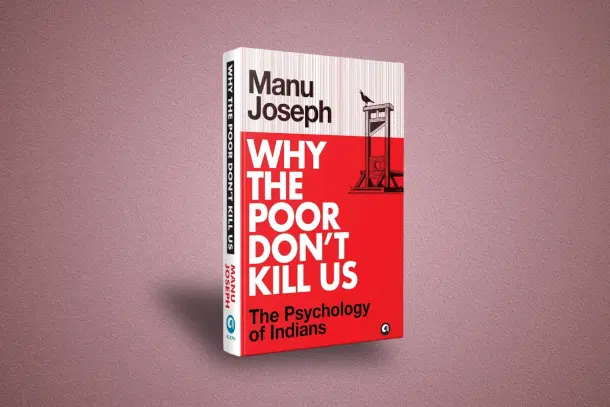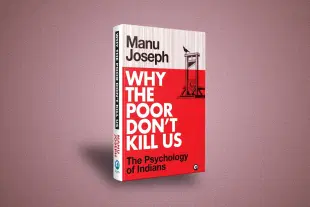Books
On Poverty, Elites, And Guillotines
Prem Ansh Sinha
Sep 13, 2025, 10:21 AM | Updated 07:47 PM IST
Save & read from anywhere!
Bookmark stories for easy access on any device or the Swarajya app.


Why the Poor Don’t Kill Us. Manu Joseph. Aleph Book Company. Pages: 266. Price: INR 599.
In a size smaller than A5 and with a length of 266 pages, one can only wonder if the book has been priced at INR 599 solely to ensure that the poor do not get to know that we know the secret behind why they have not guillotined us yet. Manu Joseph's first nonfiction has eighteen sequential essays. It tickles the brain, makes you empathise, and puts up perspectives in order. It is perhaps for those floating in their cars in the traffic on the Golf Course Road or for the forty-year-old techie transitioning to management, begrudgingly sitting in the common seating area of the airport because he could not stand the tight queue leading up to the premium lounge.
Manu begins with the question of who qualifies as poor. Although he admits that the scale is relative, he writes (p. 5), “The poor do not need a natural catastrophe to be that way. They are ancient people living in our modern times.” Yet on seeing the luxuries of daily life, they do not crawl out of their thatched roofs in the catchment areas and violently strike off all. They are satisfied, not because they have attained the highest spiritual enlightenment and have no desire for the material world, but because they are born into darkness and get used to it. Manu further writes that the horrifying poverty is why India remains a haven for the middle class. The abysmal poverty forces the government to keep the prices of the essentials low, and then we happen to consume more than what we need, leaving little to no advantage for the poor.
Why Do They Not?
Manu discusses several reasons why they do not kill us. To him, the ugly streets, buildings, and the foreboding chaos reassure the poor that the nation has not left its ancient people behind. The very revolutionary Left, to which the poor are nothing more than the subjects of photography and art exhibitions, deters the poor from revolting against its immediate upper rung by romanticising poverty, slums, ugly streets, and dilapidated buildings. In a way, Manu tries to say that the discontent visible in the West is due to the poor being aware of grand parties being thrown by their Gatsby and the clean streets that make them feel alien to the society. The very topsy-turvy local urban governance that we abuse every time we step out keeps us safe. However, Manu does specify that this in no way is a defence of the poor governance and society.
Second, Manu agrees with the Greek poet Hesiod, stating that people are more envious of their equals than of their superiors. For a poor local worker, his worst enemy, Manu says, is the poor migrant, who takes away the jobs that were apparently made for him. He provides an elaborate commentary on the caste hierarchy among the Dalits and strengthens the case for a proposed income-based reform in the reservations for scheduled castes and scheduled tribes, similar to the creamy layer in the other backward classes.
He writes (pp. 94-95), “...there are about a thousand recognised subcastes within the Dalit community that comprises over 200 million people, and they follow a caste hierarchy amongst themselves. The top echelons of the community, like the Vankars and Mahars, do not dine with or marry, or even touch the lowest layers like the Valmikis, who have traditionally been sanitation workers.” The benefits of caste-based reservations do not reach the subcastes at the bottom of the Dalit hierarchy. He further writes that the ostracised subcastes within Dalits have to settle for professions that should not even exist for humans. He notes, “They clean exreta with their hands, including in Jain monasteries where the meditating inmates refuse to kill germs, something that is unacceptable to their faith.” The imagery may unsettle anyone unaware of the realities.
Third, he writes that politicians often side with the poor, which helps keep society stable. While intellectuals and bureaucrats may be against any cause or idea, politicians, given the electoral advantage, happen to empathise with the poor. They stand by the interests of the poor in their self-interest, which coincidentally happens to ensure that the situation rarely turns ugly.
Fourth, Manu says that the very absence of legal human rights usually deters the poor or anyone participating in criminal activities. He writes (p. 22), “If at all there is anything worse than poverty, it is an Indian jail…” He talks of how criminals are bumped off in heinous crimes, and some sections of the police take pride in unconstitutional killings. He highlights (p. 106) that the only time “we knew for certain that the other side was armed too was when the Pakistani terrorists had attacked Mumbai in 2008...and a famed ‘encounter’ cop went to fight and was killed immediately in the encounter.” One can clearly say that India's inefficient legal system also paves the way for an effective deterrence against unusual crimes. Contrary to how mentally ill and dangerous people are taken care of in the West, where they happen to commit irrational crimes later, living in India is a Darwinian survival of the fittest, where they find it challenging to survive for long.
Fifth, he states that the false hope of education keeps them together. Education is a sector where all the cards are held by the elites. Although Manu is strongly against the validation of higher education and believes that non-technical jobs should not require a professional degree, he understands the current social conditions. He calls this a “classic case of co-option” (p. 71), where the rich tell the poor what they can do to become like them, but despite doing everything, the poor fall short of imitating them because there are aspects that cannot be copied, like “cultural and parenting marination”. And once the poor become a grotesque version of them, the rich move on to different professional trajectories. Manu places the example of the Indian Institute of Technology and writes that the new entrants “are not extraordinary quizzers or musicians or poets” anymore. It is primarily because the new IITians are taught to crush exams without acquiring personality points. To further strengthen his view, Manu also goes on to quote Narayana Murthy, who had once said to an audience in New York that the new IITians were substandard.
Similarly, Manu Joseph presents many compelling anecdotes and arguments to strengthen his case for why there is peace despite the widening social inequality. The book carries several one-liners fit for a viral tweet, like “Morality is the tax an idea has to pay to survive” (p. 246). There are also passing comments on many contemporary questions and debates. Another argument that one may appreciate is how there is no global right, and any such pretence on global conservative forums is a mockery of itself. Manu writes (pp. 142-144), “The ‘left’ is a low-stakes human hive of hearts that sees the world as a human hive of victims…the ‘right’ is a locally relevant culture.” Therefore, expecting any global bonhomie of local culture would only meet a dead end.
Concluding Takes
VS Naipaul in India: A Wounded Civilisation narrates an interesting anecdote. He writes that JP Narayan, the evening before his arrest, asked the students in the crowd if they would attend the classes or go to prison. All students erupted with great eagerness and enthusiasm to fill in the prisons. And when they were required to, nothing happened; the students had become a part of the great peace. Indians are naturally lazy unless it is about religion. We love public posturing and value the pretence of freedom more than liberty. However, we also stick to the status quo in society. A fine equilibrium that the elites understand, which explains why there is peace in the society.
Similarly, Manu Joseph takes us through many of his anecdotal experiences. Manu's book, in some way, is born out of his first-hand experiences. He has seen all worlds. Sometimes, the words happen to draw a smile; sometimes, you are moved. His defence of the moneylenders in Kerala and Tamil Nadu is unique. However, there are some critical takeaways that a reader may have, too.
There are times when a reader may think that the book becomes repetitive. The publisher puts no effort into keeping the blurbs on the French flap and the back cover different. And sometimes, one may wonder if the book could have been a blog. The price of a book brings promise—and in its arguments, the book falls short of its promise. Manu moves from one anecdote to another without quite building on it at times. Second, there are times when you think about whether a certain parallel was necessary. After a thorough build-up on the false hope of education, Manu simply ends it with “...we need to replace it with some other aspiration” (p. 90). It is similar to the very activists he seems to dislike in the book; he fails to provide any solution. Without any viable solution, any critique loses its weight because the existing norm can be defended as the best of the available alternatives.
Third, Manu seems to hate adding references, and his editors at the publishing house seem to be of no help, either. The footnote, which in the case of a YouTube link has simply been added with the long URL (p. 157), is convenient for an e-copy. While one may understand it is not for those seeking academically nuanced psychoanalysis or theoretical breakthroughs, in rejecting any long-held claim, belief, or theory, citations help build up credibility for the arguments.
Manu’s book is a page turner. Despite all such criticisms that one hopes would be addressed in the revised editions by the editors, the book may turn out to be a good company for a slow Sunday morning.





